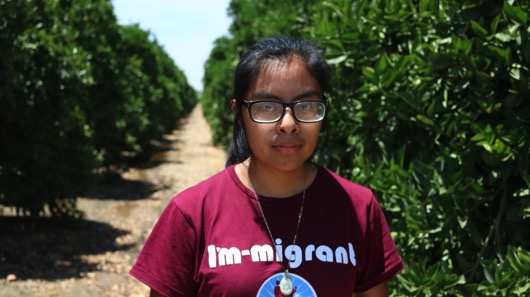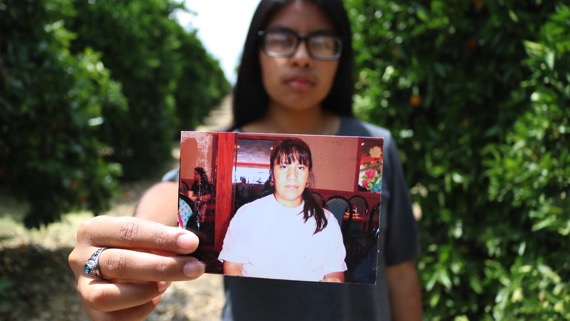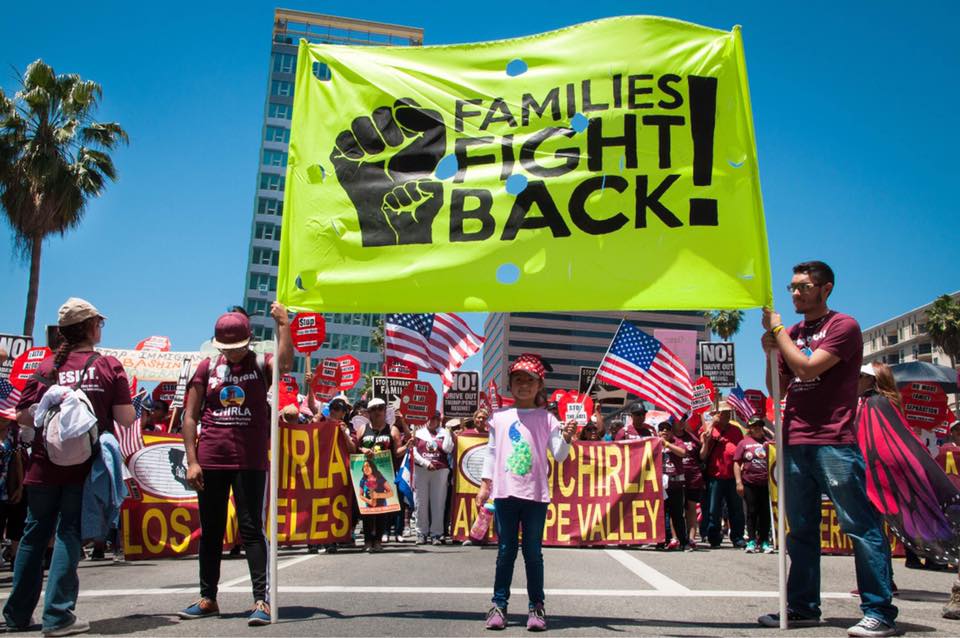[dropcap letter=”O”]n the first of May, Leticia Lopez walked alongside her mother down the dirt-dusted streets of Delano, a farmworking community in the Central Valley of California. Unable to see over the crowd marching before her, Lopez, around age six at the time, gripped the side of the stroller her mother was pushing. Vans from local television stations lined the streets.
Nearly 13 years later, Lopez, now 19 years old, doesn’t remember much else from her first May Day march. From that year on, however, she recalls her parents taking her out of school every first of May to protest in the streets.
Lopez, the daughter of migrant farmworkers from Mexico, continues to serve her community, which she said is home to many undocumented immigrants, through activism today. As pressure from the new administration’s strict stance on immigration and hostile political rhetoric towards immigrants looms over her community, Lopez joins other local activists to bring awareness to issues facing farmworkers and the greater immigrant community.
“I’ve been given the chance to stand before many and speak about my family and I have kept fighting for our immigrant community over these past few months,” Lopez said, wearing a maroon colored T-shirt with the word “immigrant” printed on the front and the word “resist” on the back. “I will remain with this movement for my people.”
First generation

[dropcap letter=”L”]opez’s parents, Manuel and Graciela Lopez, are from San Miguel Tolimán, a small village in the state of Querétaro, Mexico. Her grandfather, Romualdo Lopez came to the United States during the Bracero program, when a series of laws and diplomatic agreements brought guest farm laborers from Mexico into the United States. Her father and uncles entered the program a few years later. Then, in 1986 through the Immigration Reform and Control Act, they were all granted permanent residency in the U.S.
Her parents met in Mexico, but in 1997 her mother crossed the U.S.-Mexican border to reunite with her father, in hopes of ensuring a better future for their children. The couple settled in the Central Valley and worked as farm laborers.
Lopez was born in December 1997 in Porterville, a small agricultural town in the San Joaquin Valley of California.
From early childhood, her family followed crops throughout the seasons to earn an income. From California to Oregon to Washington, this work often started before dawn and lasted into the scorching hours of the afternoon sun. Once Lopez started school she said her family would work in the Central Valley until summer, when they would leave for Oregon to pick cherries.
Lopez has both fond and unpleasant memories of summers in Oregon. As a kid, she said making friends with children from other ranches and eating cherries with her siblings often helped her forget about the grueling work she and her family were doing.
“I guess as kids you just see it as, ‘oh, we’re gonna go work.’ You’re all excited because you’re gonna get some money, you know. They give you like a dollar, but you think it’s a lot,” Lopez said. “In that time we saw it as something fun, but then after a while, whenever you realize it’s because you’re in need of money or need this, it’s like, okay, well, I actually have to work.”
On Nov. 8, 2004, the family moved to the Woodville Farm Labor Center, or, as Lopez calls it, “the camp.” The housing complex, surrounded by some barren fields and other fruit orchards, is one of the few original farm labor camps left in the area. It’s home to agriculture workers in need of inexpensive housing. The camp was operated by the federal government until 1945 when the Tulare County Housing Authority, a state-chartered agency, took over.
The first of her family to be born and raised in the U.S., Lopez is the oldest of four siblings, all of whom are U.S. citizens. Growing up, she said she was pretty unaware of how her mother’s legal status impacted her family, particularly the fear of deportation that hung over her parents like a dark cloud for many years. Her mother filed paperwork for permanent residency a couple years after arriving in the U.S. and was told all she could do was wait for the process to move forward.
In 2009, however, fear became reality when Lopez’s mother left for Mexico to receive medical treatment for a serious illness. Medical care in the U.S. forced the family into immense debt. The decision to leave came with tremendous fear for the family — fear she wouldn’t be able to return, as they didn’t know how it would impact her application for residency.
Two years later, while still in Mexico, her mother’s application for residency was denied, due to unlawful presence, and she became barred from re-entry to the U.S. for 10 years. After the completion of her sentence, in 2019, Lopez hopes her family will be able to reopen her mother’s application for residency.
Lopez was too young to fully understand the immigration process her mom underwent at the time. Today, though, she calls the U.S. immigration system “broken.” Her mother waited over a decade to receive an appointment wherein she was given a 10-year Bar Sentence, Lopez says. “People migrate to the U.S. looking for a better life for their loved ones. They come to provide for those they have left behind, for their siblings, their children, their parents,” she said. “Many even come to find refuge and escape the crime and violence back in their hometowns, only to come here and be looked at as a ‘violent criminal.’”
Living divided

[dropcap letter=”L”]ife changed the moment the family became separated by a border. Lopez, age 11 at the time her mother left, took responsibility for caring for her siblings while her father worked. Still, education remained a top priority for the children.
In eighth grade, Lopez graduated second in her class. She recited a speech in English and Spanish at her graduation ceremony. Her eyes filled with tears and her voice began to crack at the podium, as she thanked teachers, friends and family and recognized the person motivating her success: her mother.
“My mother is a strong woman. Each time we have visited her, she is brave enough to let us go,” Lopez said in an interview. “She has always wanted the best for us. Both my parents have been strong in these last years of struggle.”
Lopez continued to place in the top of her class throughout her high school career. As a senior, she said she hoped to have her mother home by graduation.
“Once April hit, I knew she wasn’t going to be at my graduation,” Lopez said. “That’s when I decided I had to do something else. That’s when it clicked I had to fight for my mother.”
Currently a student at Porterville College, Lopez volunteers with multiple nonprofit organizations fighting for immigrant rights and awareness, including the Coalition for Humane Immigrant Rights.
Activism in the valley
[dropcap letter=”I”]n today’s political climate and with the outcome of the 2016 election, Lopez said her community has been impacted by hostile rhetoric towards immigrants and fear of deportation, particularly those working in the fields.
“It’s a different story here in the valley because it’s so based [in] agriculture that you see [undocumented immigrants] everywhere, and maybe you don’t know that the person next to you is undocumented, but they’re affected by it somehow,” Lopez said. “At least the people I know, they’re working just to sustain themselves. They’re all workers.”
She spends her weekends at swap meets and grocery stores working “Know Your Rights” booths, hosting and attending events and participating in rallies.
“I share with our immigrant community information regarding their rights with the goal of informing my community and making them aware there are people who care about them and are fighting for their right to stay together.”
Marching forward

[dropcap letter=”O”]n May 1, 2017, Lopez marched alongside her peers down the streets of Downtown Los Angeles at a May Day March.
Standing at the front of the crowd, she held a giant banner that said “Families Fight Back.”
“To some, it may just be a banner just saying those words, but to me, it was like I was carrying that message because it’s my family fighting back against the immigration system,” Lopez said.
At 5’3”, Lopez said marching with the large banner while fighting against the wind was a challenge in itself.
“It’s like saying no matter how much we get pushed around, we’re still moving and we’re still fighting back,” Lopez said. “No matter what the problems are, we’re still fighting for our immigrant community.”
As Lopez’s family continues to wait for her mother’s immigration process to move forward, she uses her experience to fight for reform.
“My main purpose is to keep families together. Coming from a separated family, I have lived through several hardships many of my peers are unaware of, but I would not want any other child to live through,” Lopez said. “Even after my mother comes back, I will continue advocating for our immigrant community, because having my mom here does not mean the struggle ends for everyone. When that time comes, I know I won’t be fighting alone, but with my mother and my family at my side as well.”
